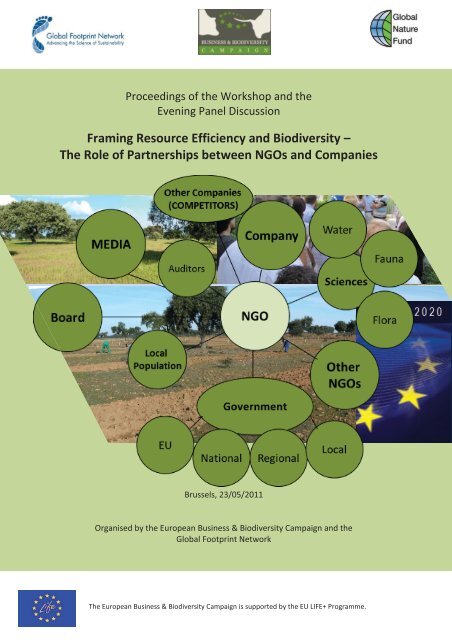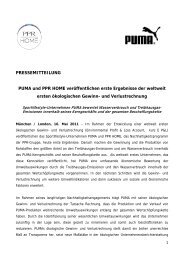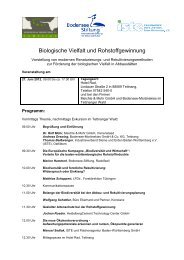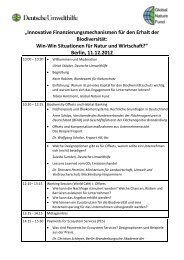here - the European Business and Biodiversity Campaign!
here - the European Business and Biodiversity Campaign!
here - the European Business and Biodiversity Campaign!
You also want an ePaper? Increase the reach of your titles
YUMPU automatically turns print PDFs into web optimized ePapers that Google loves.
Proceedings of <strong>the</strong> Workshop <strong>and</strong> <strong>the</strong><br />
Evening Panel Discussion<br />
Framing Resource Efficiency <strong>and</strong> <strong>Biodiversity</strong> –<br />
The Role of Partnerships between NGOs <strong>and</strong> Companies<br />
Brussels, 23/05/2011<br />
Organised by <strong>the</strong> <strong>European</strong> <strong>Business</strong> & <strong>Biodiversity</strong> <strong>Campaign</strong> <strong>and</strong> <strong>the</strong><br />
Global Footprint Network<br />
The <strong>European</strong> <strong>Business</strong> & <strong>Biodiversity</strong> <strong>Campaign</strong> is supported by <strong>the</strong> EU LIFE+ Programme.
Proceedings of <strong>the</strong> Workshop <strong>and</strong> <strong>the</strong> Evening Panel Discussion Framing Resource Efficiency <strong>and</strong> <strong>Biodiversity</strong> –<br />
The Role of Partnerships between NGOs <strong>and</strong> Companies<br />
Held in Brussels, Belgium, 23/05/2011<br />
Editors: Stefan Mielke, Joost Bakker, Tobias Hartmann, Benita Heinze<br />
Date: 17 August 2011<br />
Global Footprint Network<br />
Geneva Office<br />
International Environment<br />
House 2<br />
7-9 chemin de Balexert<br />
1219 Geneva<br />
Switzerl<strong>and</strong><br />
Tel: +41 (0)22 797 41 08<br />
www.footprintnetwork.org<br />
Global Nature Fund<br />
Bonn Office<br />
Kaiserstraße 185-197<br />
D-53113 Bonn<br />
Germany<br />
Tel: +49-(0)228 18 48 6940<br />
www.globalnature.org<br />
The <strong>European</strong> <strong>Business</strong> & <strong>Biodiversity</strong> <strong>Campaign</strong> is supported by<br />
<strong>the</strong> EU LIFE+ Program
Table of Contents____________________________________________________________________________<br />
Framing Resource Efficiency <strong>and</strong> <strong>Biodiversity</strong> –<br />
The Role of Partnerships between NGOs <strong>and</strong> Companies<br />
Table of Contents<br />
Table of Contents .................................................................................................................................... 1<br />
I. Introduction .......................................................................................................................................... 2<br />
II. Programme .......................................................................................................................................... 3<br />
III. Presentations ...................................................................................................................................... 4<br />
1. The Policy context: <strong>Biodiversity</strong> <strong>and</strong> resource efficiency ................................................................ 4<br />
2. Mainstreaming of biodiversity in <strong>the</strong> business sector in Europe .................................................... 5<br />
3. Success factors <strong>and</strong> pitfalls of partnerships between NGOs <strong>and</strong> companies ................................. 6<br />
4. How can NGOs design partnerships with companies? Some practical advice ............................... 7<br />
5. Lake Constance Foundation <strong>and</strong> Rewe ........................................................................................... 8<br />
IV. World Café Results ............................................................................................................................. 9<br />
V. Conclusion ......................................................................................................................................... 11<br />
1
I. Introduction____________________________________________________________________________<br />
I. Introduction<br />
The <strong>European</strong> <strong>Business</strong> & <strong>Biodiversity</strong> <strong>Campaign</strong> organised toge<strong>the</strong>r with <strong>the</strong> Global Footprint<br />
Network a workshop for NGOs all over Europe on May 23, 2011 in Brussels. The one-day workshop is<br />
<strong>the</strong> first of a series of workshops <strong>and</strong> discussed issues regarding resource efficiency <strong>and</strong> biodiversity,<br />
<strong>and</strong> <strong>the</strong> role of partnerships between NGOs <strong>and</strong> companies in Europe. The o<strong>the</strong>r workshops will be<br />
held between <strong>the</strong> second half of 2011 <strong>and</strong> 2012 in Germany, Spain <strong>and</strong> Romania.<br />
In early 2011 <strong>the</strong> <strong>European</strong> Commission launched “A resource-efficient Europe” as one of its seven<br />
2020 flagship initiatives. An important element of resource<br />
efficiency is <strong>the</strong> efficient <strong>and</strong> sustainable use of biological<br />
resources. Over <strong>the</strong> next few months, <strong>the</strong> input from NGOs <strong>and</strong><br />
companies will be crucial in <strong>the</strong> framing of this initiative. With<br />
<strong>the</strong> recent outcomes of <strong>the</strong> Convention on Biological Diversity<br />
COP 10 in Nagoya, <strong>the</strong> <strong>European</strong> Commission <strong>and</strong> <strong>the</strong> 27 EU<br />
Member States have underlined <strong>the</strong> involvement of companies<br />
in advancing <strong>the</strong> biodiversity agenda. The <strong>European</strong> Commission<br />
recently presented its 2020 <strong>Biodiversity</strong> Communication, which<br />
foresees an increased mainstreaming of biodiversity in <strong>the</strong><br />
business sector.<br />
Within this policy context, establishing a clear underst<strong>and</strong>ing of<br />
<strong>the</strong> roles <strong>and</strong> responsibilities of companies <strong>and</strong> NGOs becomes<br />
eminent. This workshop explored <strong>and</strong> extracted lessons learned<br />
from passed <strong>and</strong> ongoing partnerships between NGOs <strong>and</strong> companies in <strong>the</strong> field of biodiversity <strong>and</strong><br />
resource efficiency <strong>and</strong> thus laid <strong>the</strong> foundation <strong>and</strong> provided advice on future partnerships. This<br />
workshop was be open for NGOs only.<br />
Key topics were:<br />
� Providing up to date information about “business <strong>and</strong> biodiversity” initiatives within <strong>the</strong><br />
emerging 2020 <strong>European</strong> policy context.<br />
� Exchanging experiences of <strong>and</strong> determining conditions for partnerships between NGOs <strong>and</strong><br />
companies to improve resource efficiency <strong>and</strong> conserve biodiversity.<br />
� Establishing criteria for successful partnerships between NGOs <strong>and</strong> companies.<br />
2
II. Programme____________________________________________________________________________<br />
II. Programme<br />
Time Topic Speakers<br />
10.00-10.20 � Welcome<br />
Wiebke Herding<br />
� Round of introductions<br />
(ON:SUBJECT)<br />
10.20-10.30 � Short presentation of <strong>the</strong> <strong>European</strong><br />
Stefan Hörmann<br />
<strong>Business</strong> & <strong>Biodiversity</strong> <strong>Campaign</strong><br />
� Goals of <strong>the</strong> workshop<br />
(Global Nature Fund)<br />
10.30-10.35 � Agenda of <strong>the</strong> workshop<br />
� Listening tasks<br />
10.35-10.50 The policy context: <strong>Biodiversity</strong> <strong>and</strong> resource<br />
efficiency – an enabling environment for<br />
partnerships between NGOs <strong>and</strong> companies<br />
10.50-11.05 Mainstreaming of biodiversity in <strong>the</strong> business<br />
sector in Europe – B&B Initiatives as a catalyst<br />
Wiebke Herding<br />
(ON:SUBJECT)<br />
Sebastian Winkler<br />
(Global Footprint Network)<br />
Daan Wensing<br />
(IUCN The Ne<strong>the</strong>rl<strong>and</strong>s<br />
Leaders for Nature)<br />
11.05-11.15 Short break<br />
11.15-11.30 � Presentation of listening tasks Wiebke Herding<br />
(ON:SUBJECT)<br />
11.30-11.45 Success factors <strong>and</strong> pitfalls of partnerships<br />
Stefan Mielke<br />
between NGOs <strong>and</strong> companies<br />
(Global Nature Fund)<br />
11.45-12.20 � Plenary discussion Wiebke Herding<br />
(ON:SUBJECT)<br />
12.20-13.30 Lunch break<br />
13.30-15.00 World Café: How can NGOs <strong>and</strong> companies work<br />
toge<strong>the</strong>r to reverse biodiversity loss <strong>and</strong> bring<br />
about a resource-efficient Europe?<br />
� 3 rounds à 25 min<br />
15.00-15.30 � Presentation of World Café results Wiebke Herding<br />
(ON:SUBJECT)<br />
15.30-16.00 Coffee break<br />
16.00-16.40 How can NGOs design partnerships with<br />
Am<strong>and</strong>a del Rio Murillo<br />
companies? – Some practical advice<br />
(Fundacion Global Nature),<br />
Sam Tarrant (RSPB)<br />
16.40-17.00 � Plenary discussion Wiebke Herding<br />
(ON:SUBJECT)<br />
17.00-17.10 � Wrap-up Stefan Mielke<br />
(Global Nature Fund)<br />
17.10-17.30 � Closing round Wiebke Herding<br />
(ON:SUBJECT)<br />
3
III. Presentations: Policy Context: <strong>Biodiversity</strong> <strong>and</strong> resource efficiency – Sebastian Winkler__________________<br />
III. Presentations<br />
1. The Policy context: <strong>Biodiversity</strong> <strong>and</strong> resource efficiency<br />
Presentation by Sebastian Winkler, Global Footprint Network<br />
Sebastian provided an overview of <strong>the</strong> evolving global <strong>and</strong> EU policy context which potentially would<br />
entail greater collaboration between companies <strong>and</strong> NGOs. At <strong>the</strong> global level <strong>and</strong> in <strong>the</strong> lead up to<br />
Rio+20, <strong>the</strong> Green Economy (UNEP) <strong>and</strong> Green Growth (OECD) initiatives are key policy areas. At <strong>the</strong><br />
<strong>European</strong> level, this is expressed through <strong>the</strong> Resource Efficiency Strategy, one of <strong>the</strong> seven EU 2020<br />
flagship initiatives. The strategy aims to transform <strong>European</strong> production <strong>and</strong> consumption towards<br />
resource-efficiency. In September 2011, <strong>the</strong> Commission will publish a roadmap of how to achieve<br />
this aim. The door for input on concrete targets <strong>and</strong> actions is open for all stakeholders. Defining <strong>the</strong><br />
targets <strong>and</strong> implementing <strong>the</strong> actions will<br />
only be possible through an informed<br />
dialogue between companies <strong>and</strong> NGOs.<br />
He stressed that ownership <strong>and</strong> trust are<br />
critical for delivery.<br />
In May 2011, <strong>the</strong> EU 2020 biodiversity<br />
strategy was published, which calls<br />
amongst o<strong>the</strong>rs, for better protection for<br />
ecosytems <strong>and</strong> a stronger involvement of<br />
<strong>the</strong> private sector in biodiversity<br />
conservation.<br />
The economic crisis may be an opportunity<br />
to transform companies towards resourceefficient<br />
production beyond mere CSR<br />
activities. Raw materials <strong>and</strong> ecosystem<br />
services are becoming increasingly scarce<br />
<strong>and</strong> may not be available in <strong>the</strong> future<br />
anymore. Many companies are ill equipped<br />
to deal with <strong>the</strong>se new challenges <strong>and</strong><br />
partnerships with NGOs may provide<br />
beneficial for both partners <strong>and</strong> <strong>the</strong><br />
environment. In general, NGOs are more<br />
trusted than companies to bring about<br />
positive change.<br />
Why working with <strong>the</strong> private sector…<br />
During <strong>the</strong> past two decades, partnerships<br />
between companies <strong>and</strong> NGOs have become more common. Although both partners have <strong>the</strong>ir own<br />
motivations, <strong>the</strong>y are joined in <strong>the</strong> aim to induce positive change. The main drivers for companies are<br />
a better image, an increased business market <strong>and</strong> preparedness for new legislative requirements.<br />
The EU 2020 agenda presents itself as a vehicle to align <strong>the</strong>se goals with <strong>the</strong> objectives of NGOs.<br />
Finally, Sebastian outlines <strong>the</strong> most important lessons he learned from his experiences of forming<br />
partnerships with companies:<br />
� Clear rules of collaboration are essential for a successful partnership.<br />
� A pro-active, future oriented agenda needs to be agreed upon.<br />
� SMEs should not be forgotten as potential partners.<br />
4
III. Presentations: Mainstreaming of biodiversity in <strong>the</strong> business sector in Europe – Daan Wensing___________<br />
2. Mainstreaming of biodiversity in <strong>the</strong> business sector in Europe<br />
Presentation by Daan Wensing,IUCN <strong>the</strong> Ne<strong>the</strong>rl<strong>and</strong>s, Leaders for Nature<br />
Daan started with a brief description of IUCN’s background in <strong>the</strong> Ne<strong>the</strong>rl<strong>and</strong>s. During <strong>the</strong> past years,<br />
it almost entirely relied upon government funding which left <strong>the</strong> organisation vulnerable to budget<br />
cuts. In 2010, <strong>the</strong> government funding was reduced drastically, so that half of its staff was made<br />
redundant. IUCN in <strong>the</strong> Ne<strong>the</strong>rl<strong>and</strong>s was thoroughly reorganised <strong>and</strong> a more diverse funding base<br />
was created by involving companies.<br />
One of <strong>the</strong> new initiatives is Leaders for Nature. It is an<br />
international learning <strong>and</strong> action oriented network for current<br />
<strong>and</strong> future business leaders of 19 companies, which was<br />
created by decisive action of about 90 young professionals who<br />
www.leadersfornature.nl<br />
wrote a letter to <strong>the</strong>ir CEOs calling for more attention on biodiversity <strong>and</strong> ecosystem services.<br />
When those companies did not act, <strong>the</strong> young professionals lobbied more intensively <strong>and</strong> in<br />
collaboration with IUCN in <strong>the</strong> Ne<strong>the</strong>rl<strong>and</strong>s, Leaders for Nature was established. In <strong>the</strong> beginning,<br />
membership was free <strong>and</strong> <strong>the</strong> focus was on raising awareness among companies about biodiversity<br />
<strong>and</strong> ecosystem services.<br />
After a while it became apparent that awareness-raising was not enough to facilitate change. The<br />
focus has shifted towards designing targets <strong>and</strong> implementing action plans. The meetings are not<br />
public. They are organised by <strong>and</strong> for <strong>the</strong> participating companies, targeting CEOs, senior<br />
management <strong>and</strong> young professionals. Many of <strong>the</strong> first members were consulting agencies. Today,<br />
<strong>the</strong> membership base encompasses almost all corporate sectors. The programme of Leaders for<br />
Nature covers different business to business meetings: master classes, Leaders for Nature forums,<br />
inspiration meetings <strong>and</strong> best practice sessions. Overall,<br />
<strong>the</strong> initiative focuses on <strong>the</strong> importance of ecosystems<br />
<strong>and</strong> biodiversity for <strong>the</strong> business society; <strong>the</strong><br />
importance of integrating sustainability within <strong>the</strong><br />
core business taking into consideration <strong>the</strong> principle<br />
of ecosystem thinking; <strong>and</strong> <strong>the</strong> importance of showing<br />
leadership within various management levels<br />
regarding Corporate Social Responsibility.<br />
Leaders for Nature is an initiative that<br />
was started by <strong>the</strong> private sector<br />
calling for more attention for<br />
biodiversity <strong>and</strong> ecosystem services.<br />
(source: Leaders for Nature)<br />
5
III. Presentations: Success factors <strong>and</strong> pitfalls of partnerships between NGOs <strong>and</strong> companies – Stefan Mielke __<br />
3. Success factors <strong>and</strong> pitfalls of partnerships between NGOs <strong>and</strong> companies<br />
Presentation by Stefan Mielke, Global Nature Fund<br />
Stefan provided <strong>the</strong> results of two surveys that have been conducted among NGOs <strong>and</strong> companies in<br />
Germany <strong>and</strong> Europe in autumn 2010 <strong>and</strong> spring 2011. Out of 31 German environmental NGOs, 12<br />
took part in <strong>the</strong> survey. At <strong>the</strong> <strong>European</strong> level, 145 environmental NGOs were contacted <strong>and</strong> 29<br />
participated. It is possible that a bias is present in <strong>the</strong> data because mostly questions were answered<br />
by companies NGOs <strong>and</strong> that do not reject partnerships.<br />
NGOs most often stated <strong>the</strong> following three reasons for collaborating with companies:<br />
� additional funding for NGO activities<br />
� finding solutions to ecological problems <strong>and</strong><br />
� to harness <strong>the</strong> marketing expertise of companies to increase public awareness<br />
Companies mentioned <strong>the</strong> following three main reasons for collaborating with NGOs:<br />
� improving reputation<br />
� securing core business activities <strong>and</strong> exp<strong>and</strong>ing <strong>the</strong>m to new customer groups <strong>and</strong><br />
� finding solutions to social <strong>and</strong> ecological problems<br />
From <strong>the</strong> surveys it became apparent that successful partnerships are based on carefully considering<br />
<strong>the</strong> partner. This includes looking at which<br />
companies fulfil <strong>the</strong> core values of NGOs<br />
<strong>and</strong> defining a mutual interest. During <strong>the</strong><br />
partnership, common goals should be<br />
defined <strong>and</strong> monitored. The relation should<br />
be balanced <strong>and</strong> respect <strong>the</strong> partner, its<br />
approach <strong>and</strong> issue framing. A regular <strong>and</strong><br />
continuing exchange of information<br />
between <strong>the</strong> two partners is essential, as<br />
well as a joint communication strategy for<br />
external communication.<br />
NGOs have made both positive <strong>and</strong><br />
negative experiences with partnerships.<br />
Many NGOs were satisfied by <strong>the</strong> fact that<br />
Most of <strong>the</strong> <strong>European</strong> NGOs are open to<br />
collaborating with <strong>the</strong> private sector.<br />
<strong>the</strong>y could influence strategic decisions of companies <strong>and</strong> that <strong>the</strong> companies showed a genuine<br />
interest in <strong>the</strong> NGO. The financial commitment <strong>and</strong> <strong>the</strong> involvement of employees from both<br />
organisations were also mentioned as positive experiences.<br />
Negatively perceived was <strong>the</strong> fact that companies considered <strong>the</strong> different approach taken by NGOs<br />
as an attack, or <strong>the</strong>y simply did not underst<strong>and</strong> how NGOs work. O<strong>the</strong>r negative experiences<br />
included an unequal relationship with companies in which <strong>the</strong> NGOs were patronised, or even used<br />
for <strong>the</strong>ir reputation.<br />
The last 20 years have seen big changes in <strong>the</strong> relationship between <strong>the</strong> corporate sector <strong>and</strong> NGOs.<br />
Collaborations are more frequent <strong>and</strong> NGOs can now make a real difference in harnessing <strong>the</strong>ir<br />
knowledge <strong>and</strong> experience. In <strong>the</strong> future, <strong>the</strong> number of partnerships will probably rise even more.<br />
They will become more professional <strong>and</strong> issue related. Strategic considerations will play an<br />
increasingly important role for parties.<br />
6
III. Presentations: How can NGOs design partnerships with companies? – Am<strong>and</strong>a del Rio__________________<br />
4. How can NGOs design partnerships with companies? Some practical advice<br />
Presentation by Am<strong>and</strong>a del Rio, Fundacion Global Nature España<br />
Am<strong>and</strong>a started with a brief introduction to FGN, followed by a presentation of several projects<br />
involving collaboration with companies such as cleaning up <strong>the</strong> effects of an oil spill which has been<br />
caused by BP. Ano<strong>the</strong>r project involves legume cropping in protected areas, with <strong>the</strong> intention of<br />
selling <strong>the</strong>se legumes to <strong>the</strong> Carrefour supermarket chain. The money is <strong>the</strong>n used to support <strong>the</strong><br />
conservation of Natura 2000 sites. A third project is about a plant nursery which has <strong>the</strong> purpose of<br />
growing endemic species. Children, elderly <strong>and</strong> disabled people participate in this project.<br />
All stakeholders (competitors of <strong>the</strong> company, o<strong>the</strong>r NGOs, different governments, scientific bodies<br />
etc.) take part within <strong>the</strong> mentioned projects. T<strong>here</strong> is no blue print for cooperation. The projects in<br />
general are adapted to <strong>the</strong> respective stakeholders taking part.<br />
Some companies want a broader media exposure than o<strong>the</strong>rs.<br />
The extent of media exposure influences <strong>the</strong> results of <strong>the</strong><br />
projects. Companies can be interested in <strong>the</strong>se projects, for<br />
example due to <strong>the</strong> amount of exposure being given. However,<br />
<strong>the</strong> project delivers real benefits in protecting nature.<br />
Unilever collaborated with FGN<br />
to restore wetl<strong>and</strong>s.<br />
(Source: FGN)<br />
Working toge<strong>the</strong>r with companies means that NGOs are<br />
innovating: research is <strong>the</strong> transformation of money into<br />
knowledge <strong>and</strong> innovation <strong>the</strong> transformation of knowledge<br />
into money. It is also about practical implementation <strong>and</strong> <strong>the</strong> use<br />
of creativity. The business sector can provide a stable income for<br />
NGOs. Before collaborating, many stereotypes need to be overcome. Both partners also need to<br />
define <strong>the</strong> type of partnership <strong>the</strong>y want to start: communication, dialogue or participation. These all<br />
have different commitments, instruments <strong>and</strong> temporal horizon.<br />
Lessons learned by both parties:<br />
� Different visions do not need to be obstacles<br />
� NGOs can be mediators<br />
� Both companies <strong>and</strong> NGOs give more value to direct contact with <strong>the</strong> o<strong>the</strong>r party than <strong>the</strong> use of<br />
certification <strong>and</strong> external guidelines<br />
� Round tables are used to facilitate developments, agreements <strong>and</strong> commitment<br />
Both parties benefit from <strong>the</strong> mutual access to contacts <strong>and</strong> expertise. Sharing is <strong>the</strong> key in <strong>the</strong>se<br />
projects. To avoid <strong>the</strong> failing of projects, one should not have too high expectations, hold regular<br />
meetings <strong>and</strong> begin with a proposal <strong>and</strong> smaller projects.<br />
7
III. Presentations: Lake Constance Foundation <strong>and</strong> Rewe – Marion Hammerl_____________________________<br />
5. Lake Constance Foundation <strong>and</strong> Rewe<br />
Presentation by Marion Hammerl, Lake Constance Foundation<br />
Marion starts with a short introduction to <strong>the</strong> Lake Constance Foundation (LCF) <strong>and</strong> Rewe<br />
supermarket chain. As part of <strong>the</strong> <strong>European</strong> <strong>Business</strong> <strong>and</strong> <strong>Biodiversity</strong> <strong>Campaign</strong>, Rewe is <strong>the</strong><br />
biodiversity advocate for <strong>the</strong> food sector. It was chosen because it is <strong>the</strong> biggest fruit producer in<br />
Germany <strong>and</strong> produces many of its fruits in <strong>the</strong> Lake Constance Region, w<strong>here</strong> <strong>the</strong> LCF resides. The<br />
fruit production sometimes leads to conflicts when environmental <strong>and</strong> economic goals are not<br />
aligned.<br />
Rewe agreed to a cooperation between <strong>the</strong> LCF <strong>and</strong> ‘Obst vom<br />
Bodensee’ for a time period of five years. The goal is to have a<br />
minimum of 50% of all farmers implement biodiversity<br />
measures on at least 80% of <strong>the</strong> cultivation surface. The<br />
measures target <strong>the</strong> apple orchards <strong>and</strong> its effects will be<br />
monitored by NABU <strong>and</strong> Bund, two of <strong>the</strong> largest German<br />
environmental NGOs. Examples of measures are <strong>the</strong> use of<br />
native flower seeds, insect friendly pesticides, ‘insect hotels’<br />
(artificial homes for insects) <strong>and</strong> information tables for<br />
tourists. Fruits being produced at <strong>the</strong>se orchards are called<br />
‘pro-planet’ products.<br />
REWE apples with <strong>the</strong> Pro-Planet<br />
logo<br />
The first investigation shows that <strong>the</strong> orchards are in a much<br />
better condition than expected. Due to <strong>the</strong> positive experiences gained with this project, <strong>the</strong> aim is<br />
to transfer <strong>the</strong> biodiversity initiative not only to o<strong>the</strong>r fruit production regions, but also to products<br />
o<strong>the</strong>r than apples. Fur<strong>the</strong>rmore, it is intended to integrate biodiversity into quality management <strong>and</strong><br />
quality certification systems. To reduce <strong>the</strong> monitoring effort, training sessions for assessors <strong>and</strong><br />
certifiers will be offered.<br />
All fruit producers must comply with criteria for State labels. These labels have no ecological criteria<br />
integrated. The intention is to integrate ecological criteria in <strong>the</strong>se labels.<br />
The REWE supermarket chain has developed Pro-planet products. Pro-planet is not a br<strong>and</strong>, nor a<br />
label or a certification. It only indicates that additional (environmental or social) criteria were taken<br />
into account when producing <strong>the</strong> product. Some of <strong>the</strong>se products (for example apples from <strong>the</strong> Lake<br />
Constance region) integrate biodiversity criteria. Soon, 20% of all sales will come from pro-planet<br />
products. The feedback of customers is monitored to improve <strong>the</strong> (quality of) <strong>the</strong> Pro-planet<br />
products.<br />
Rewe is not <strong>the</strong> only company that tries to assess its influence on biodiversity. O<strong>the</strong>r supermarkets<br />
developed tools to integrate environmental criteria, but biodiversity is not always integrated.<br />
The Lake Constance Foundation is a small NGO but its size does not hamper it in working with<br />
companies or vice versa. It is possible that o<strong>the</strong>r, bigger NGOs see LCF as a guinea pig when it comes<br />
to collaborating with companies.<br />
8
IV. World Café Results ________________________________________________________________________<br />
IV. World Café Results<br />
The World Café is a method to establish an open <strong>and</strong> creative conversation process on a certain topic<br />
in a business meeting or workshop. The method’s aim is to surface participant’s collective<br />
knowledge, share ideas <strong>and</strong> insights, <strong>and</strong> gain a deeper underst<strong>and</strong>ing of <strong>the</strong> subject <strong>and</strong> <strong>the</strong> issues<br />
involved. The results of <strong>the</strong> workshop’s World Café are presented in this chapter.<br />
1. What is our motivation to create successful partnerships?<br />
The motivation of NGOs to engage in partnerships with companies is manifold. It should be clear that<br />
<strong>the</strong> reasons are not always purely idealistic. Most often, NGOs seek to solve an environmental<br />
problem at a local, regional, national or international level that can not be solved by <strong>the</strong> NGO alone<br />
or that is caused by a company or industry sector. Companies on <strong>the</strong> o<strong>the</strong>r h<strong>and</strong> have access to<br />
different financial resources to fund partnerships for <strong>the</strong> protection <strong>and</strong> sustainable use of<br />
biodiversity. Fur<strong>the</strong>rmore, companies have expertise in addressing different audiences which NGOs<br />
are interested in approaching to improve awareness <strong>and</strong> facilitate action. In a time, when public<br />
authorities relinquish more <strong>and</strong> more duties <strong>and</strong> reduce public funding, NGOs are looking for<br />
different partners (i.e. companies) to achieve <strong>the</strong>ir objectives.<br />
2. Which elements are missing at <strong>the</strong> moment?<br />
� Practical <strong>and</strong> easy to use methodologies to<br />
assess <strong>the</strong> impact <strong>and</strong> dependence of<br />
companies on biodiversity<br />
� Performance indicators to monitor <strong>the</strong><br />
progress of implementing a company’s<br />
biodiversity strategy<br />
� Knowledge <strong>and</strong> experiences to underst<strong>and</strong><br />
<strong>the</strong> business case for biodiversity (e.g. drivers<br />
of change, legal framework, customer base,<br />
financial incentives) <strong>and</strong> convey <strong>the</strong> message<br />
to companies<br />
� Valuation of environmental services that do<br />
not provide a service in economic terms<br />
(intrinsic value of existence)<br />
� More open-mindedness <strong>and</strong> business thinking<br />
3. What advice can we give ourselves <strong>and</strong> o<strong>the</strong>rs?<br />
Traditional l<strong>and</strong> uses that have positive effects<br />
on <strong>the</strong> biodiversity can be supported by NGOcompany<br />
collaborations. (source:FGN)<br />
Much of <strong>the</strong> advice given focused on inter <strong>and</strong> inner-NGO aspects. NGOs should be aware of <strong>the</strong>ir<br />
strengths because cooperation between <strong>the</strong>m can be used to achieve more. The different roles that<br />
NGOs play should be exploited, for example <strong>the</strong> “good cop, bad cop” strategy with organizations like<br />
Greenpeace that are mainly for <strong>the</strong>ir public protest campaigns.<br />
NGOs should also improve <strong>the</strong>ir knowledge, especially related to economic issues, so that <strong>the</strong>y are<br />
able to underst<strong>and</strong> <strong>and</strong> communicate better with <strong>the</strong> business partners. This collaboration needs to<br />
be seen as a long-term approach. Enough time should be taken into account for finding shared values<br />
<strong>and</strong> risks. NGOs need to be realistic about what <strong>the</strong>y can deliver <strong>and</strong> communicate <strong>the</strong> collaboration<br />
as something positive, a joint effort of creating something toge<strong>the</strong>r.<br />
9
IV. World Café Results ________________________________________________________________________<br />
To overcome continuing challenges, e.g. after a committed CEO stepped down, social media <strong>and</strong><br />
internal communication can be employed to “anchor” <strong>the</strong> project with <strong>the</strong> entire staff instead of with<br />
only one person.<br />
FGN presented its collaboration with companies<br />
(Source:FGN)<br />
4. How can we come to a strategic<br />
approach to partnerships?<br />
It was agreed that no new platform is required.<br />
The idea of having companies approaching a<br />
platform which <strong>the</strong>n connects <strong>the</strong> company with<br />
NGOs is ra<strong>the</strong>r difficult, but one can learn from<br />
IUCN NL’s “Leaders for Nature” program <strong>and</strong> <strong>the</strong><br />
regional forums of <strong>the</strong> EBBC that connect NGOs<br />
<strong>and</strong> companies more directly on a regional basis<br />
with a shared geographical interest that gives<br />
companies an incentive to commit.<br />
Fur<strong>the</strong>rmore it is important that NGOs agree to<br />
join forces. Companies take advantage of this<br />
disagreement <strong>and</strong> postpone taking action. The<br />
capacity of <strong>the</strong> EBBC should be harnessed.<br />
Fur<strong>the</strong>r NGO workshops organized by <strong>the</strong> campaign <strong>and</strong> <strong>the</strong> IUCN World Conservation Congress can<br />
give new impulses <strong>and</strong> should be used to prepare an action plan with shared goals. A networked<br />
approach could be chosen to be implemented <strong>and</strong> it will be necessary to start slow, e.g. by organizing<br />
a meeting.<br />
10
V. Conclusion_______________________________________________________________________<br />
V. Conclusion<br />
From <strong>the</strong> discussions <strong>and</strong> <strong>the</strong> presentation that were held during <strong>the</strong> day it was concluded that when<br />
NGOs <strong>and</strong> companies collaborate on environmental projects, <strong>the</strong> most important issues to be taken<br />
into account are:<br />
� The implementation of a platform, possibly online is one option for companies <strong>and</strong> NGOs to<br />
meet<br />
� When working with companies, it is good to have NGOs blaming companies <strong>and</strong> refusing to<br />
collaborate (‘bad cop’) <strong>and</strong> o<strong>the</strong>rs that are more accommodating (‘good cop’)<br />
� When limited resources are present, a long term strategy is <strong>the</strong> best option. One option is to<br />
link this strategy to <strong>the</strong> EU 2020 strategy (or one of its flagship initiatives).<br />
� Building networks: In order to initiate projects toge<strong>the</strong>r with companies, it is very important<br />
to have personal contacts<br />
� At <strong>the</strong> next NGO workshop, it would be preferable to have companies presenting as well<br />
All participants agreed that more activities need to be linked <strong>and</strong> that lessons need to be shared.<br />
The following questions are still open:<br />
� How to make sure that not only specific initiatives implement partnerships<br />
� How to use <strong>the</strong> outcomes of <strong>the</strong> workshop in <strong>the</strong> organisation of upcoming activities<br />
� How to use <strong>the</strong> outcomes when it comes to resource efficiency<br />
� Is it necessary to create a platform for NGOs <strong>and</strong> companies <strong>and</strong> if so how can it benefit<br />
biodiversity<br />
� How much coordination <strong>and</strong> discussion do we need before we act<br />
� How to use specialist knowledge <strong>and</strong> how to bring it toge<strong>the</strong>r<br />
11
VI. Literature on Resource Efficiency, <strong>Biodiversity</strong> <strong>and</strong> Partnerships____________________<br />
VI. Literature on Resource Efficiency, <strong>Biodiversity</strong> <strong>and</strong> Partnerships<br />
Arenas, D., Sanchez, P., Murphy, M., & Vives, J. (2011). Corporate Relations with local<br />
communities <strong>and</strong> NGOs. Institute for social innovation Esade.<br />
Austin, J.E. (2000). The Collaboration Challenge: How Nonprofits <strong>and</strong> <strong>Business</strong>es succeed<br />
through strategic alliances. New York: The Drucker Foundation<br />
Cowe, R. (2004). <strong>Business</strong>/ NGO Partnerships - What’s <strong>the</strong> Payback? Ethical<br />
Corporation, available from Global Policy Forum<br />
http://www.globalpolicy.org/ngos/credib/2004/0404partner.htm (last accessed 17/08/11)<br />
Global Environmental Management Initiative (GEMI) <strong>and</strong> Environmental Defense Fund<br />
(2008). Guide to Successful Corporate-NGO Partnerships:, Retrieved August 3, 2011<br />
http://www.gemi.org/resources/GEMI-EDF%20Guide.pdf (last accessed 17/08/11)<br />
Palazzo, B. (2010). An Introduction to Stakeholder Dialogue. In Pohl, M., & Tolhurst, N.<br />
(eds.), Responsible <strong>Business</strong>: How to manage a CSR strategy successfully (pp.17-42). Wiley<br />
RSE, CSR Europe, <strong>European</strong> Alliance for CSR (2008). Proactive Stakeholder Engagement:<br />
Practical Guide for companies <strong>and</strong> stakeholders<br />
http://www.csreurope.org/data/files/toolbox/Stakeholder_engagement.pdf (last accessed<br />
17/08/11)<br />
The Partnering Initiative (2008). Developing <strong>the</strong> art <strong>and</strong> science of cross-sector partnerships<br />
http://www.<strong>the</strong>partneringinitiative.org/ (last accessed 17/08/11)<br />
12
www.business-biodiversity.eu<br />
Coordination<br />
___________________________________________________________________________<br />
Global Nature Fund<br />
An international foundation for <strong>the</strong> protection of<br />
nature <strong>and</strong> <strong>the</strong> environment<br />
Partners of <strong>the</strong> <strong>European</strong> <strong>Business</strong> & <strong>Biodiversity</strong> <strong>Campaign</strong><br />
______________________________________________________________________________<br />
IUCN Regional Office for Pan Europe<br />
The largest global environmental network<br />
dedicated to nature conservation.<br />
Fundación Global Nature<br />
A non-profit organisation committed to nature<br />
conservation in Spain.<br />
Bodensee-Stiftung<br />
An international NGO that fosters sustainable<br />
economy in <strong>the</strong> wider Lake Constance region.<br />
Triple E<br />
A centre of expertise specialising in <strong>the</strong><br />
relationship between economy <strong>and</strong> ecology.<br />
dokeo<br />
A consultancy that advises companies on<br />
CSR communications, strategy <strong>and</strong><br />
reporting.<br />
ALTOP<br />
A publishing <strong>and</strong> media company that<br />
promotes sustainable solutions.<br />
The <strong>European</strong> <strong>Business</strong> <strong>and</strong> <strong>Biodiversity</strong> <strong>Campaign</strong> is supported under EU LIFE+<br />
13








